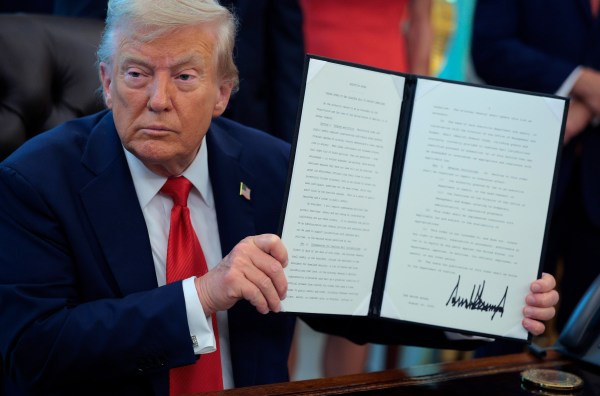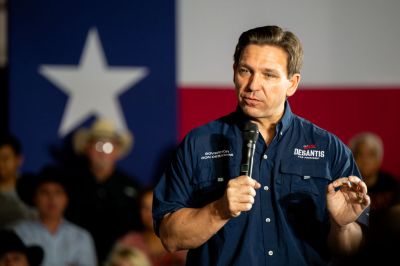When a strategy is failing, it’s natural to assume that a different strategy would succeed.
Natural but silly. For us pessimists, snug in the bosom of despair, not every problem has a solution. If you’re in a jam and can’t see a way out, consider the possibility that there isn’t one.
Fatalism isn’t a happy philosophy but it does mesh nicely with the reality that life isn’t fair and people (fine, most people) are terrible.
Which brings us to today’s subject: It’s officially bedwetting season for Ron DeSantis 2024.
On April 24, a month before he formally entered the race, the governor stood at 23.4 percent in the RealClearPolitics national average. Today, after numerous events and many, many millions of dollars in campaign spending, he’s at 20.6 percent.
Donors are restless. Republican operatives are frustrated. Conservative media, Rupert Murdoch’s properties most notably, is growing skeptical. Sources tell CNN that Team Ron “doesn’t anticipate national polls fluctuating much” before next month’s primary debate, which they’re eyeing as an opportunity to “alter the trajectory of the race.” The campaign has reportedly begun to worry about Tim Scott’s viability in Iowa, not without reason.
The air around Tallahassee is humid with flop sweat. I understand why DeSantis fans and Trump-haters are calling for a change in strategy.
What I don’t understand is why they think a new strategy would serve him better than the current one has.
When a candidate is trailing the frontrunner by more than 30 points, do something different is sensible advice. But we should take stock of where his current strategy has delivered him.
His share of the national vote exceeds the combined share of every candidate who’s trailing him, a field that includes a sitting senator, two former governors, and the most recent former vice president of the United States. He was within 15 points of Trump as recently as March. In Iowa, where he’s concentrated his efforts, the last two surveys conducted by the pro-Trump outfit American Greatness have Trump well under 50 percent and place DeSantis within 15 and 23 points of the lead, respectively. There’s grounds to believe that the frontrunner is vulnerable there and that he’s getting more vulnerable by the minute.
Meanwhile DeSantis continues to raise gobs of money, making the competition for fundraising effectively a two-man race. And he remains the clear second choice of most Republican voters, never once finishing as low as third in any national or state poll that I’ve seen. A Morning Consult survey this week placed him at 55 percent when GOP voters were asked which candidates are their first or second choice for president. Trump finished only slightly higher at 60 percent. The third-place candidate, Mike Pence, landed at 14.
When Rich Lowry says, “If Trump weren’t in the race, DeSantis pretty clearly would be the frontrunner,” he’s arguably understating matters. If Trump weren’t in the race, I’m not sure the Republican primary would be much more competitive than it is now. With the possible slight exception of Vivek Ramaswamy, no candidate thus far has shown potential for growth sufficient to threaten DeSantis.
Not a terrible result for a politician plainly lacking in the shallow charisma that American voters, especially Republicans, crave in their presidents. Also not nearly good enough to win the nomination unless something changes dramatically. So I’m open to the idea that DeSantis should do something different.
But what something different should he do?
I can think of a few things. He should have gotten in the race earlier, working with the legislature to repeal Florida’s “resign to run” law sooner than he did. Letting Trump go unchallenged for months while defining him as a Jeb Bush/Paul Ryan establishment Republican was an error. So was DeSantis’ decision to avoid interviews with mainstream media outlets, a mistake he’s belatedly correcting. He needs the exposure, and more importantly he needs forums that’ll showcase the press’ antagonism toward him. Fighting publicly with reporters will earn the governor lots of cheap but valuable One Of Us points.
Many grander diagnoses of his problems have been kicking around lately in right-wing media but each depends on a degree of faith in the good sense of Republican voters that I find baffling—especially from Never Trumpers, normally clear-eyed observers of the state of the modern right. Bedwetting season has reduced Trump antagonists to grasping at alternative strategies which, it seems to me, are more likely to pop DeSantis’ sagging balloon than to inflate it.
Let’s go through them.
‘You can’t run around Trump. You need to run through him.’
You’ll hear this anytime DeSantis passes on an opportunity to challenge Trump’s fitness for office, which is pitifully often. Asked recently about January 6, he implied that he doesn’t have strong feelings about the subject because, uh, he wasn’t there. (“I didn’t enjoy seeing what happened,” he timidly allowed.) After the frontrunner was indicted last month, the governor was outraged—not as his opponent but at the prosecutors who charged him, for allegedly practicing a partisan double standard.
You can’t run around Trump, the DeSantis critics say admonishingly, you need to run through him. Like Chris Christie.
How’s Chris Christie doing in the polls?
RCP has him at 2.6 percent nationally, behind Vivek “Who?” Ramaswamy. In New Hampshire, where he’s targeted his campaign, he’s at 4.7 percent. That’s good enough for third place for now but it represents just a quarter of DeSantis’ share of the vote. Nikki Haley, Tim Scott, Ramaswamy, Mike Pence, and even Doug Burgum are all within 3 points of Christie, leaving him one or two bad polls away from slipping to eighth place.
He’s doing the Lord’s work with his relentless truth-bombing effort against Trump. I’m thrilled that he’ll be on the debate stage next month even if his nemesis isn’t. But Christie’s vocal Trump criticism comes at a steep cost: He continues to have the highest unfavorable rating in the Republican field, pulling a 22-50 split in a Marist poll last month. Pence, the villain of January 6 in the populist narrative, pulls a 45-41 favorability by comparison.
Think of it. The right holds more of a grudge against Christie for criticizing Trump’s character than it does against a guy who, many believe, facilitated the Democrats’ theft of the 2020 election. Dwelling on Trump’s moral corruption is behavior so common on the left yet so shamefully uncommon on the right as to have effectively disqualified Christie from his party’s nomination, more so than even Mike Pence’s role in “the steal” has disqualified him.
So maybe running “at” Trump the way Christie has isn’t the swiftest move for a serious contender like DeSantis, however morally gratifying it would be to see him do it.
The other problem with knocking DeSantis for failing to run “at” Trump is that … he is running “at” Trump. Not in the way Never Trumpers like me would prefer, by attacking his character, but by highlighting the ways in which Trump has failed his populist fan base.
DeSantis’ anti-gay ad, revisiting some of the frontrunner’s trans-friendly statements over the years, is an example of him running “at” Trump. His staff’s habit of highlighting Trump’s support for COVID vaccines is another. Attacking Trump for failing to build the border wall, for showing disloyalty toward beloved MAGA figures, and for damaging the party with his childish brand of politics are all cases of him running “at” Trump.
The right’s Trump skeptics are righteously sensitive to the fact that most Republicans are too cowardly to criticize the cult leader by name. But DeSantis is criticizing him by name, often, on a number of topics. Just not the topics that speak most forcefully to Trump’s unfitness, as to do so would tank the governor’s campaign the same way doing so has tanked Christie’s.
‘DeSantis is Too Online. He should run further to the center.’
There’s truth to this critique. DeSantis 2024 is Very—Very Very—Online. I’m all for campaigns meeting voters where most of them live, in the real world. Talk more about pocketbook issues is all but foolproof advice in American politics.
The wrinkle for the governor is that the guy he’s chasing has already been president and had a famously strong economy for most of his administration, before COVID intervened. “I’ll do it again,” Trump will tell voters. What can DeSantis plausibly say to make himself seem like a better bet on the economy by comparison? Particularly when, on one very important pocketbook issue, he’s far more compromised than Trump is?
“He could at least stop taking the fringiest right-wing position on every cultural issue,” you might reply. He could. But would that win him or lose him Republican votes on balance?
The essence of the Republican hostage crisis since 2015 is the belief that mainstream conservative voters will support populist presidential candidates but populist voters won’t support conservative ones. Trump’s victory in 2016 and near-victory in 2020 proved the first part of that formulation. His obvious contempt for the party and the anxiety that induces in Republican leaders are strong evidence of the second part. Last month, CBS found that 28 percent of likely primary voters are considering only Trump among the candidates on the ballot, a number greater than the share who have ruled him out.
DeSantis’ primary strategy recognizes the reality of the hostage crisis. If he runs to the middle, wooing mainstream conservatives, he risks alienating the populists who see him as a less compromising yet also more electable authoritarian than Trump. And once those voters bolt, they’re gone for good. With Trump himself in the race, there’s no reason for them to return to DeSantis. They can revert to form and nominate the guy who’s promising them “retribution” against their cultural enemies.
The modern right is a revolutionary movement. Running to the center in a Republican primary and attacking Trump from the left would mark DeSantis as a member of the ancien regime.
If, on the other hand, DeSantis runs to Trump’s right and manages to woo away some of Trump’s populist base, mainstream conservatives who dislike him but dislike Trump more will eventually reconcile themselves to him as their last best chance at turning the page on this era. I offer myself as evidence: As loathsome as I find DeSantis’ politics, I’ve said many times and will say again here that I’ll vote for him in the primary so long as he remains the highest-polling Trump alternative.
He’s the only candidate in the race with a plausible strategy to reduce Trump’s support. All of the normies—Pence, Haley, Scott, Christie—are running in the foolish belief a la 2016 that they can beat Trump by consolidating the mainstream conservative vote. If they can clear the rest of the field somehow and maneuver Trump into a one-on-one race, the theory goes, then the nomination will be theirs. Just like it was Ted Cruz’s seven years ago.
Back in reality, Trump is substantially more popular among Republicans today than he was in 2016. And as comforting as it is to believe that there’s a non-populist majority out there ready to unite behind a consensus Trump alternative, it just ain’t true. In the CBS poll I mentioned, 48 percent of Republicans said Trump is a contender for their vote to go along with the 28 percent who are already committed to him. That’s more than three-quarters of the party who are open to nominating him a third time.
There simply aren’t enough normies left in this thoroughly corrupted party to deliver victory to a centrist-y Trump alternative over the objections of populists. Even if there were, DeSantis would need to compete with Pence, Haley, and the rest for that bloc; it’s implausible that there’d be enough votes left after they took their cut that he’d outpoll Trump for the nomination. And even if he somehow managed that, he’d face the prospect of angry Trumpers boycotting the general election, dooming his chances against Biden.
The only plausible path to victory is the one he’s following: Run hard to the right, toss lots of cultural red meat at woke-hating populists and evangelical social cons in Iowa in hopes of picking off MAGA voters, and trust that normie Republicans will flock to you as the prophesied Trump-Slayer once the frontrunner’s lead starts to narrow.
If that means convincing swing voters across the country that you’re a “wannabe dictator” in the process, hey. Can’t worry about the general election until you’ve won the primary.
‘DeSantis shouldn’t have run, or should have waited until 2028.’
Yesterday Philip Klein surveyed the governor’s predicament and wondered if the lesson here isn’t that DeSantis was doomed from the start.
The bottom line is that considering DeSantis is running against a former president who has been impeached twice, indicted twice, and found liable for sexual assault in a jury trial; who is directly or substantially responsible for Republican defeats in three straight election cycles; who refused to accept defeat in a presidential election and triggered a mob assault on the nation’s Capitol; who is overwhelmingly unpopular among general-election voters; who would be limited to one term even if elected; and who, in spite of all of this, is still polling with 53 percent support among Republicans in a crowded primary field, it’s not obvious to me there is a strategy that is going to work.
That’s a man after my own pessimistic heart. Heath Mayo offered further cause for despair when he noted that, in the past week alone, the GOP has seen the speaker of the House call Marjorie Taylor Greene one of his best members, the head of the National Republican Senatorial Committee admit he’s talking to Kari Lake about a Senate run, and the MAGA right’s favorite Congress-troll speculate about letting Russia join NATO.
If that’s not enough, the chairman of the RNC went on TV a few days ago and refused to say that Biden is the legitimately elected president.
This is, perhaps, not a party that’s prepared to nominate anything less than a hallucinatory conspiracy theorist for president. Ron DeSantis has become quite skilled at performative ruthlessness, but in hindsight it was probably never enough. A political organization in which getting indicted makes your polls go up, not down, and in which announcing that you’re unvaccinated leads to audience cheers was never going to nominate a politician who seemed, until fairly recently, more or less normal.
But the governor had to try.
It’s hard to remember but until this spring DeSantis was quite competitive with Trump. There were polls last year before and after his landslide reelection victory in Florida putting him in the lead in key states. He shot up nearly 10 points in the national average last November and hovered at around 30 percent for most of the winter. Not until Alvin Bragg indicted Trump in Manhattan at the end of March did the frontrunner take a commanding lead.
It seemed perfectly sensible for the governor to have assumed that his youth, his base-pleasing populist agenda, and the GOP’s post-midterm jitters about Trump’s electability—particularly in the wake of criminal charges—would send Republican voters stampeding into his camp. In hindsight, he made the same mistake many Never Trumpers are surprisingly now making in urging him to change strategies: He gave the right way too much credit for behaving rationally.
Even so, I still think he had to try.
“You have a moment,” Casey DeSantis has reportedly said about her husband’s window of opportunity for becoming president. Chris Christie knows something about that, having leveraged his pugnacity toward leftist enemies like the local teachers union into becoming the Hot New Thing among the Republican base circa 2012. He decided to wait until 2016 to run, when he was no longer the Hot New Thing. You know how that turned out.
There’s every reason to think DeSantis would have been just as stale in 2028 had he waited. (More so, as he’ll be out of office by then. Christie was still governor of New Jersey when he ran for president seven years ago.) Especially given the way the Republican Party is trending: Because the competition among populists to perform their ruthlessness is so intense, it’s a cinch that some other Hot New Thing will have captured the base’s imagination five years from now. Perhaps by then populist Republicans will have embraced fascism overtly. Or perhaps they’ll just want to nominate Trump again.
Or both. The two aren’t mutually exclusive.
If, then, DeSantis had passed on the race—or if he dropped out now—there’s no reason to think his chances in the next cycle would be better. They’d be worse. He’d have alienated his current fans by refusing to run this cycle, angered anti-Trump Republicans who were keen for him to offer an alternative to Trump, and earned a reputation as a coward who talks tough but wouldn’t go toe-to-toe with the party chieftain when he had the chance. He did the right thing by running.
And he’s not licked yet.
His strategy of all-in culture-war pandering remains promising in Iowa, I think. If he wins the caucuses, there’s a chance of a “dam break” in his favor: Mainstream conservatives might ditch the Pences and Haleys for DeSantis while some populists, believing that the governor had no chance to beat Trump, might reconsider. No one would bet on Iowa catapulting DeSantis to the nomination, especially after it failed to do so for Ted Cruz in 2016, but I think he still enjoys a much better chance of becoming president in this cycle than he will in 2028.
The potential cost of abandoning his current strategy for a new one geared at winning normies is ending up in political no-man’s land, where he’s too mainstream for populists yet remains too populist for mainstreamers. He should think carefully before changing course. Decisions made in moments of panic are rarely good ones.







Please note that we at The Dispatch hold ourselves, our work, and our commenters to a higher standard than other places on the internet. We welcome comments that foster genuine debate or discussion—including comments critical of us or our work—but responses that include ad hominem attacks on fellow Dispatch members or are intended to stoke fear and anger may be moderated.
With your membership, you only have the ability to comment on The Morning Dispatch articles. Consider upgrading to join the conversation everywhere.